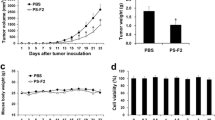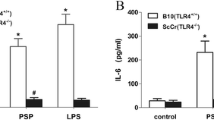Abstract
The protein-bound polysaccharide isolated from basidiomycetes (PSK), a biological response modifier, has been used as immunotherapeutic agent for the treatment of cancers. It has been demonstrated previously that PSK activates various types of immune cells in vitro, and orally administrated PSK activates anti-tumor CD4+ T cell response in mesenteric lymph nodes (MLNs). The detailed mechanism of action of PSK, however, has not been elucidated yet. The objective of the present study was to clarify the molecular mechanism of immunopotentiating effects of PSK using primary culture of the MLN CD4+ T cells. T cell receptor (TCR) stimulation-induced interleukin-2 production from MLN CD4+ T cells was significantly augmented by PSK in a concentration-dependent manner, and the augmentation was reflected at mRNA level. Furthermore, PSK augmented transcriptional activities of nuclear factor of activated T cells and activator protein 1, and phosphorylation of extracellular signal-regulated kinase 1/2 and linker for activation of T cells induced by TCR stimulation, whereas PSK had no influences without TCR stimulation. Collectively, the results indicate that PSK augments activation of MLN CD4+ T cells, probably by modulating the TCR signaling, and provide important knowledge for the elucidation of the true target molecule(s) of PSK.








Similar content being viewed by others
Abbreviations
- ANOVA:
-
Analysis of variance
- AP1:
-
Activator protein 1
- CRE:
-
cAMP-response element
- ERK:
-
Extracellular signal-regulated kinase
- GALT:
-
Gut-associated lymphoid tissue
- GAPDH:
-
Glyseraldehyde-3-phosphate dehydrogenase
- IFN-g:
-
Interferon-gamma
- IL:
-
Interleukin
- LAT:
-
Linker for activation of T cells
- LPS:
-
Lipopolysaccharide
- MLN:
-
Mesenteric lymph node
- NF-AT:
-
Nuclear factor of activated T cells
- Pam3CSK4:
-
Pam3Cys-Ser-(Lys)4
- PMA:
-
Phorbol 12-myristate 13-acetate
- RT-PCR:
-
Reverse transcriptase-polymerase chain reaction
- TCR:
-
T cell receptor
- TLR:
-
Toll-like receptor
References
Chu DH, Morita CT, Weiss A (1998) The Syk family of protein tyrosine kinases in T-cell activation and development. Immunol Rev 165:167–180
Constant S, Pfeiffer C, Woodard A, Pasqualini T, Bottomly K (1995) Extent of T cell receptor ligation can determine the functional differentiation of naive CD4+ T cells. J Exp Med 182:1591–1596
Croft M, Swain SL (1995) Recently activated naive CD4 T cells can help resting B cells, and can produce sufficient autocrine IL-4 to drive differentiation to secretion of T helper 2-type cytokines. J Immunol 154:4269–4282
Fisher M, Yang LX (2002) Anticancer effects and mechanisms of polysaccharide-K (PSK): implications of cancer immunotherapy. Anticancer Res 22:1737–1754
Franklin RA, Tordai A, Patel H, Gardner AM, Johnson GL, Gelfand EW (1994) Ligation of the T cell receptor complex results in activation of the Ras/Raf-1/MEK/MAPK cascade in human T lymphocytes. J Clin Invest 93:2134–2140
García-Lora A, Pedrinaci S, Garrido F (2001) Protein-bound polysaccharide K and interleukin-2 regulate different nuclear transcription factors in the NKL human natural killer cell line. Cancer Immunol Immunother 50:191–8
Harada M, Matsunaga K, Oguchi Y, Iijima H, Tamada K, Abe K, Takenoyama M, Ito O, Kimura G, Nomoto K (1997) Oral administration of PSK can improve the impaired anti-tumor CD4+ T-cell response in gut-associated lymphoid tissue (GALT) of specific-pathogen-free mice. Int J Cancer 70:362–372
Hirai R, Oguchi Y, Sugita N, Matsunaga K, Nomoto K (1993) Enhancement of T-cell proliferation by PSK. Int J Immunopharmacol 15:745–750
Hirose K, Zachariae CO, Oppenheim JJ, Matsushima K (1990) Induction of gene expression and production of immunomodulating cytokines by PSK in human peripheral blood mononuclear cells. Lymphokine Res 9:475–483
Jain J, Loh C, Rao A (1995) Transcriptional regulation of the IL-2 gene. Curr Opin Immunol 7:333–342
Kanazawa M, Mori Y, Yoshihara K, Iwadate M, Suzuki S, Endoh Y, Ohki S, Takita K, Sekikawa K, Takenoshita S (2004) Effect of PSK on the maturation of dendritic cells derived from human peripheral blood monocytes. Immunol Lett 91:229–238
Komai-Koma M, Jones L, Ogg GS, Xu DM, Liew FY (2004) TLR2 is expressed on activated T cells as a costimulatory receptor. Proc Natl Acad Sci USA 101:3029–3034
Lewis RS (2001) Calcium signaling mechanisms in T lymphocytes. Annu Rev Immunol 19:497–521
Lowry OH, Rosebrough NJ, Farr AL, Randall RJ (1951) Protein measurement with the Folin phenol reagent. J Biol Chem 193:265–275
Matsunaga K, Hosokawa A, Oohara M, Sugita N, Harada M, Nomoto K (1998) Direct action of a protein-bound polysaccharide, PSK, on transforming growth factor-beta. Immunopharmacology 40:219–230
Matsunaga K, Morita I, Oguchi Y, Fujii T, Yoshikumi C, Nomoto K (1987) The effect of a biological response modifier, PSK, on the intestinal immune system in tumor-bearing mice. Anticancer Res 7:509–512
Nakazato H, Koike A, Saji S, Ogawa N, Sakamoto J (1994) Efficacy of immunochemotherapy as adjuvant treatment after curative resection of gastric cancer. Study Group of Immunochemotherapy with PSK for Gastric Cancer. Lancet 343:1122–1126
Noguchi K, Tanimura H, Yamaue H, Tsunoda T, Iwahashi M, Tani M, Mizobata S, Hotta T, Arii K, Tamai M, Terasawa H (1995) Polysaccharide preparation PSK augments the proliferation and cytotoxicity of tumor-infiltrating lymphocytes in vitro. Anticancer Res 15:255–258
Ohwada S, Ikeya T, Yokomori T, Kusaba T, Roppongi T, Takahashi T, Nakamura S, Kakinuma S, Iwazaki S, Ishikawa H, Kawate S, Nakajima T, Morishita Y (2004) Adjuvant immunochemotherapy with oral Tegafur/Uracil plus PSK in patients with stage II or III colorectal cancer: a randomised controlled study. Br J Cancer 90:1003–1010
Saito T, Yamasaki S (2003) Negative feedback of T cell activation through inhibitory adapters and costimulatory receptors. Immunol Rev 192:143–160
Samelson LE, O’Shea JJ, Luong H, Ross P, Urdahl KB, Klausner RD, Bluestone J (1987) T cell antigen receptor phosphorylation induced by an anti-receptor antibody. J Immunol 139:2708–2714
Sathish JG, Walters J, Luo JC, Johnson KG, Leroy FG, Brennan P, Kim KP, Gygi SP, Neel BG, Matthews RJ (2004) CD22 is a functional ligand for SH2 domain-containing protein-tyrosine phosphatase-1 in primary T cells. J Biol Chem 279:47783–47791
Swain SL, Bradley LM, Croft M, Tonkonogy S, Atkins G, Weinberg AD, Duncan DD, Hedrick SM, Dutton RW, Huston G (1991) Helper T-cell subsets: phenotype, function and the role of lymphokines in regulating their development. Immunol Rev 123:115–144
Vanky F, Wang P, Klein E (1992) The polysaccharide K (PSK) potentiates in vitro activation of the cytotoxic function in human blood lymphocytes by autologous tumor cells. Cancer Immunol Immunother 35:193–198
Wange RL, Samelson LE (1996) Complex complexes: signaling at the TCR. Immunity 5:197–205
Yamasaki S, Nishida K, Hibi M, Sakuma M, Shiina R, Takeuchi A, Ohnishi H, Hirano T, Saito T (2001) Docking protein Gab2 is phosphorylated by ZAP-70 and negatively regulates T cell receptor signaling by recruitment of inhibitory molecules. J Biol Chem 276:45175–45183
Yefenof E, Gafanovitch I, Oron E, Bar M, Klein E (1995) Prophylactic intervention in radiation-leukemia-virus-induced murine lymphoma by the biological response modifier polysaccharide K. Cancer Immunol Immunother 41:389–396
Zhang H, Morisaki T, Matsunaga H, Sato N, Uchiyama A, Hashizume K, Nagumo F, Tadano J, Katano M (2000) Protein-bound polysaccharide PSK inhibits tumor invasiveness by down-regulation of TGF-beta1 and MMPs. Clin Exp Metastasis 18:343–352
Zhang J, Somani AK, Siminovitch KA (2000) Roles of the SHP-1 tyrosine phosphatase in the negative regulation of cell signaling. Semin Immunol 12:361–378
Zhang W, Trible RP, Zhu M, Liu SK, McGlade CJ, Samelson LE (2000) Association of Grb2, Gads, and phospholipase C-gamma 1 with phosphorylated LAT tyrosine residues. J Biol Chem 275:23355–23361
Acknowledgments
The authors thank Takao Ando for his comment on the manuscript and Shunsuke Ito for his technical assistance.
Author information
Authors and Affiliations
Corresponding author
Rights and permissions
About this article
Cite this article
Asai, H., Iijima, H., Matsunaga, K. et al. Protein-bound polysaccharide K augments IL-2 production from murine mesenteric lymph node CD4+ T cells by modulating T cell receptor signaling. Cancer Immunol Immunother 57, 1647–1655 (2008). https://doi.org/10.1007/s00262-008-0498-1
Received:
Accepted:
Published:
Issue Date:
DOI: https://doi.org/10.1007/s00262-008-0498-1




